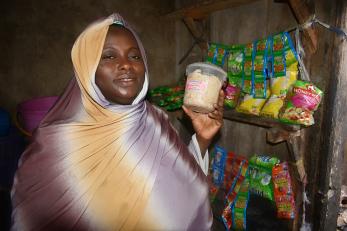Connecting enterprising women to business opportunities: Jummai’s Story

Jummai Mohammed is a mother of five, living in the host community of Mairi, about 15 km outside of the Borno State capital. She was a petty trader, who made her living selling spices by the roadside, and lacked the technical and business skills to run her business in a structured manner which allowed for growth.
Things took a new turn for Jummai, when she was onboarded as a participant on the USAID Funded Feed the Future Nigeria Rural Resilience Activity (RRA) in a partnership between Mercy Corps and a local humanitarian organization, whose goal is to build the capacity of women in fragile settings to build their resilience by engaging in economic activities that increase their revenue.
A local organization, the Zenith of the Girl Child and Women Initiative Support (ZEGCAWIS) was engaged through a competitive process. They applied through a Notice of Funding Opportunity (NOFO), which comes out of a basket of funds that drives investment into a humanitarian context.
Through her interaction with ZEGCAWIS, Jumai received critical skills to grow her business. Her capacity was built around business management, she received financial literacy and fintech skills. Equally important – she received training in good manufacturing practices, packaging and branding, and was linked to large chain supermarket stores when she upgraded her products and registered her business officially. She is now a taxpayer. She also received important conflict management skills which are critical functions in her context.
Through her interactions with Mercy Corps Nigeria, she upgraded her skills, formalized her business, improved her recordkeeping, and accessed new markets. As a result of the support, she now produces more hygienic food products, that are packaged according to standards, and are now sold at higher prices, which means more income for her. This access to better markets is critical for Jummai to better cope with the unexpected shocks that could send her spiraling back into a more precarious situation.
In fact, before she met Mercy Corps, she earned $43 dollars a month, today her earnings are about $109 per month — more than double. And she now employs two women from her community. She has also diversified her product base to include peanut paste, which is highly nutritional, and can be made into baby food or pudding for kids, and used in soups. By selling this product, she is contributing to improved nutritional outcomes in her community. Jummai is now a taxpayer who meets her family needs.
Reflecting on the impact on the wider community, ZEGCAWIS who received funding through Mercy Corps has reached 3000 women-led microenterprises in under three months. Women like Jummai now use recordkeeping tools and knowledge that help them to make informed decisions about product pricing, while helping them to be deliberate about creating a savings culture to grow their businesses. Informed decision-making about pricing, profits and records that can help Micro, Small and Medium Enterprises (MSMEs) to access credits and loans were identified as key constraints limiting MSME growth.
The record-keeping tool which Mercy Corps introduced to MSMEs like Jummai, helped them keep track of their business transactions to be able to make informed decisions around setting prices, knowing their profits, and being deliberate in saving to grow their businesses. This helped them build the culture of keeping records which is one of the major challenges affecting MSMEs in Northeast Nigeria.
Our data shows that business revenues, investments, and jobs created increased when compared to baseline figures. For example, in April 2022, participants generated sales worth roughly $291,000. However, by September 2022, with improved business practices, and record keeping, sales grew to $431,000 per month for 2,700 participants. We also noted higher production capacity was recorded. For example, those who are working in food processing recording increased from 669kg to 980kg within the same time period.
Mercy Corps also tracks the value of investment that our participants are investing into their businesses. We have seen increases from $330,000 to $862,000. Finally, we tracked the jobs created. At the baseline, participants had a staff strength of about 3,700 and the staff strength has now increased to 4,218.
There is real evidence that Mercy Corps is committed about empowering women - to build their confidence, a stronger voice, control over assets, and resources to fend for their family.
This intervention also caught the attention of the Ministry of Women Affairs which reached out to partner to understand the model and adopt the model to further impact more women entrepreneurs in Borno state, and not only provide training.
Mercy Corps’ early analysis into the humanitarian crisis in Borno state highlighted that local markets— of which microenterprises are a backbone — and social networks are the most important sources of resilience for those coping with all of the compounding effects of prolonged conflict.
In the end, the local partner’s organizational capacity was, we increased revenues and investments in remote communities, enhanced access to nutritious food products in local markets, and are influencing how the government will implement going forward.